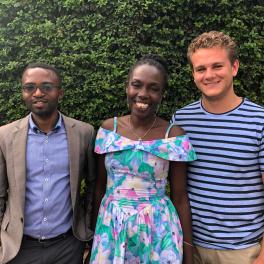
Jacob Caponi is an Ohio State undergraduate alum and current sociology graduate student at University of Michigan.
Why did you decide to attend Ohio State?
I had no idea how to apply for college, fill out the FAFSA or do anything related to higher education in high school. My favorite teacher was an Ohio State alumna. She said I would be a good fit at Ohio State, so I took her word for it. Application fees were expensive for my family, so this was the only school I applied to in Ohio. Although I had no idea what I was doing in the beginning, it all worked out in my favor.
What were some of the most important lessons you learned during your time at Ohio State?
Critical thinking and empathy. I started my undergrad degree during the 2016 election and ended during the COVID-19 pandemic. I saw how communities within and outside Ohio State were created and cared for one another through these significant events.
You conducted undergraduate research during your time at Ohio State. Can you tell us about the study?
I have been involved in several research projects during my time at Ohio State. The project I have worked on the longest, “Reentry and Reintegration of Perpetrators of Genocide” with associate professor of sociology Dr. Hollie Nyseth Brehm, allowed me to travel to Rwanda twice thanks to university grants. I crafted my own research project focused on women who participated in genocide or were accused of participating in genocide, and how their reentry and reintegration processes differ from men in the same context. These experiences led me to switch my post-grad plans from public health to sociology as I learned how multiple systems of oppression (colonialism, patriarchy, racism, etc.) interact and overlap to influence wellbeing.
What were some of the other formative experiences you had during your time as a student?
The most formative class I took at Ohio State was Sociology 2211S, the Inside-Out course, with sociology lecturer Dr. Brenda Chaney. Growing up, I’ve always had family members incarcerated, so the Ohio Reformatory for Women was not a new place for me. However, the critical pedagogy used inside a prison was the “ah-ha” moment when I knew I wanted to be a professor. I also have to give a shout out to lecturer Kim Lopez who taught me how to think critically and empathetically. I will take what these two instructors taught me about teaching and engaging in the community for the rest of my life.
You’re heading to the University of Michigan to pursue a PhD in sociology. What do you hope to study, and how do you hope to use the PhD some day?
My broad area of interest is currently violence and human rights. I’m interested in how varying types of violence (systemic to interpersonal) interact during times of mass atrocities. I hope to be a professor and make an impact by creating research and policy that mitigates and deters violence. I would not be where I am today without the mentors I found at Ohio State as a first-generation college student, so mentorship as well as public sociology are high on my professional and personal goals.
